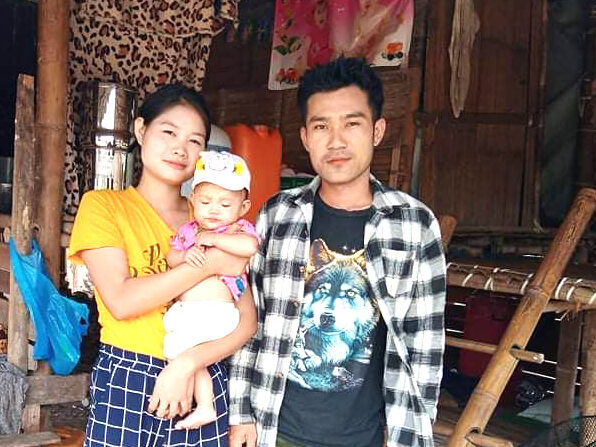Saw Thein Soe is 29 years old and is one of the IDPs who have benefited from the Unicef-supported project in Kayin State. He lives with his wife and son at the camp.
The conflict started in 2016, and he felt no longer safe in their home village. His family moved to the IDP camp in Myaing Gyi Ngu township. While he was living in his native village, he sold betel leaves for his earnings. In the current IDP camp, he drives a motorcycle taxi and runs a small grocery store at home.
“We suppose that the diarrhea outbreak was because the water from the dug well was not clean enough for drinking. If we had diarrhea, we had to go to the hospital. It is also costly. We faced some health problems”
Soon, the Unicef Emergency WASH project came to their area and supported WASH supplies to improve community health. The project covered some needy areas in Kayin State.
The project aims to optimize the health impacts of infrastructure operations, especially in water and sanitation. Clean water and sanitation facilities can improve maternal and child health in poor households, particularly in conflict areas.
The community receives water filters as part of WASH supplies and NFI distribution activities, and the Saw Thein Soe family has also become one of the beneficiaries.
“The water filter can give enough water for five people to drink a day.” Saw Thein Soe Said.
The project also distributed water purification powders and water purification tablets to the beneficiaries to use when the water is polluted during the wet season.
Their family is happier now because they are in good health: Unicef Emergency project supports the community to become a healthy lifestyle.

သန့်စင်ဘေးကင်းသောရေသည် ရပ်ရွာအား ကျန်းမာသော လူနေမှုဘဝပုံစံကို ပံ့ပိုးပေးသည်
ကိုစောသိန်းစိုးသည် အသက် ၂၉ နှစ်ရှိပြီဖြစ်ပြီး ကရင်ပြည်နယ်တွင် Unicef မှ ပံ့ပိုးကူညီထားသည့် စီမံကိန်းမှ အကျိုးခံစားခဲ့ရသော IDP များအနက်မှ တစ်ဦးပင်လည်းဖြစ်သည်။ ယင်းဒုက္ခသည်စခန်းတွင် ဇနီးနှင့်သားတို့နှင့်အတူ နေထိုင်နေခြင်းလည်းဖြစ်သည်။ လွန်ခဲ့သော ၂၀၁၆ ခုနှစ်က ၎င်းတို့၏ရွာပတ်ဝန်းကျင်တွင် ပဋိပက္ခဖြစ်ပွားခဲ့ပြီး ဆက်လက်နေထိုင်ရန် လုံခြုံမှုမရှိတော့ဟု ခံစားလာရသဖြင့် မြိုင်ကြီးငူမြို့နယ်ရှိ စစ်ရှောင်ဒုက္ခသည်စခန်းသို့ ပြောင်းရွှေ့နေထိုင်ခဲ့ကြသည်။ ရွာတွင် နေထိုင်စဉ် ဝင်ငွေအတွက် ကွမ်းရွက်ရောင်းချပြီး လက်ရှိစခန်းတွင်လည်းမော်တော်ဆိုင်ကယ်တက္ကစီ မောင်းနှင်ကာ အိမ်တွင်ကုန်စုံဆိုင်ငယ်တစ်ခု ဖွင့်လှစ်၍ မိသားစုအတွက် ဝင်ငွေကိုရှာဖွေခဲ့သည်။
“ ရေနဲ့ပတ်သက်တဲ့ ကျန်းမာရေးပြဿနာတွေ ဒီမှာကြုံရလေ့ရှိတယ်။ တူးထားတဲ့ရေက သောက်သုံးဖို့ မသန့်ရှင်းတာကြောင့် ဝမ်းပျက်ဝမ်းလျှောဖြစ်ရတာလို့ ယူဆရပါတယ်။ ဝမ်းပျက်ရင် ဆေးရုံသွားရတယ်။ ဒီတော့ငွေကုန်ကြေးကျလည်း များပါတယ်” ဟု သူက ပြောဆိုသည်။
များမကြာမီတွင် Unicef Emergency WASH စီမံကိန်းသည် ၎င်းတို့၏ဒေသသို့ရောက်ရှိလာပြီး ရပ်ရွာကျန်းမာရေးကို တိုးတက်ကောင်းမွန်လာစေရန် ရေနှင့် သန့်ရှင်းရေးအထောက်အကူပြု ပစ္စည်းများကို ပံ့ပိုးပေးခဲ့သည်။ စီမံကိန်းသည် ကရင်ပြည်နယ်အတွင်း လိုအပ်လျက်ရှိသောဒေသအချို့ကို အဓိကထား၍ အကူအညီပေးရေးလုပ်ငန်းများကို အကောင်အထည်ဖော်ဆောင်ရွက်နေခြင်းလည်းဖြစ်သည်။
စီမံကိန်းသည် အခြေခံအဆောက်အဦးလုပ်ငန်းများ၏ ကျန်းမာရေးဆိုင်ရာ အကျိုးသက်ရောက်မှုများကို ပိုမိုကောင်းမွန်အောင် လုပ်ဆောင်ရန် ရည်ရွယ်ပြီး အထူးသဖြင့် ရေနှင့် သန့်ရှင်းရေးကဏ္ဍတို့ကို ဦးတည်ထားလုပ်ဆောင်ပေးခြင်းလည်းဖြစ်သည်။
ယင်းအထောက်အပံ့များသည် ဆင်းရဲနွမ်းပါးသော အိမ်ထောင်စုများ အထူးသဖြင့် ပဋိပက္ခဖြစ်ပွားရာ ဒေသများတွင် မိခင်နှင့်ကလေး ကျန်းမာရေးကို မြှင့်တင်ပေးနိုင်သည်လည်းဖြစ်သည်။ ရပ်ရွာလူထုသည် WASH ထောက်ပံ့ရေးနှင့် NFI ဖြန့်ဖြူးရေးလုပ်ငန်းများ၏ တစ်စိတ်တစ်ပိုင်းအနေဖြင့် ရေသန့်စင်စက်များကို လက်ခံရရှိပြီး စောသိန်းစိုးတို့ မိသားစုသည်လည်း အကျိုးခံစားခွင့်များထဲမှ တစ်ဦးဖြစ်လာခြင်းဖြစ်သည်။
“ရေသန့်စက်က လူငါးယောက် တစ်နေ့ကို ရေလုံလောက်အောင် ထုတ်ပေးနိုင်ပါတယ်။” ကိုစောသိန်းစိုးက ရှင်းပြပြောဆိုသည်။
စီမံကိန်းအနေဖြင့်လည်း မိုးရာသီရေညစ်ညမ်းနေချိန်တွင် အသုံးပြုရန်အတွက် ရေဆိုးသန့်စင်ဆေးမှုန့်များနှင့် ရေသန့်စင်ဆေးပြားများကိုလည်း ဖြန့်ဝေပေးခဲ့သည်။ Unicef Emergency WASH စီမံကိန်းသည်လည်း ရပ်ရွာလူထုအား ကျန်းမာသောလူနေမှုဘဝပုံစံဖြစ်လာစေရန် ကူညီပံ့ပိုးပေးနိုင်ခဲ့ပြီး ကိုစောသိန်းစိုးတို့မိသားစုအနေဖြင့်လည်း ယခုအခါတွင် ကျန်းမာရေးကောင်းမွန်လာရသည့်အတွက် ပျော်ရွှင်ဝမ်းမြောက်လျက်ရှိသည်။
Written By: Aung Cho Min | M&E Officer | UNICEF WASH Project
Edited By: Pyae Phyo Lin, Communications Officer
Photo: © 2022 ADRA Myanmar | UNICEF WASH Project

